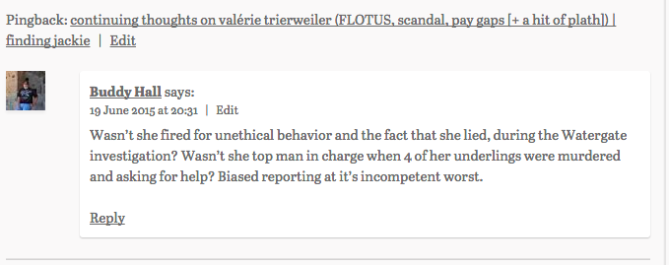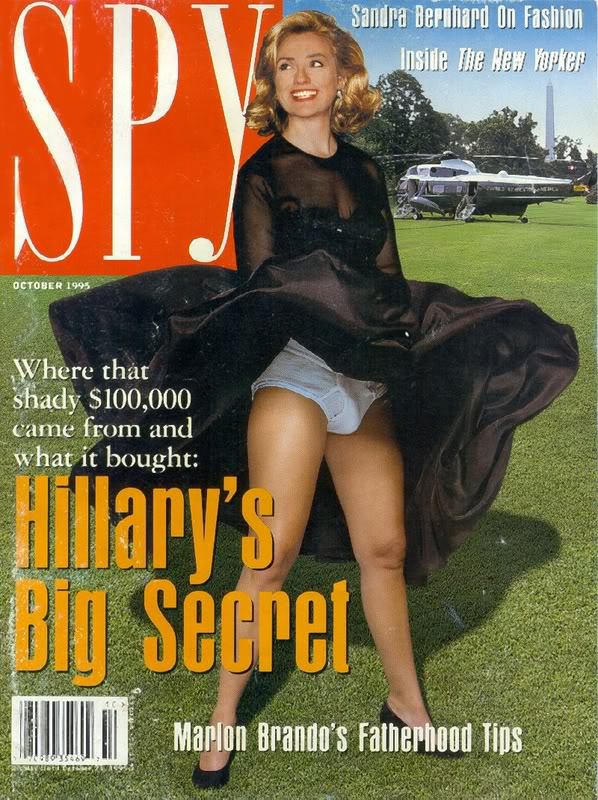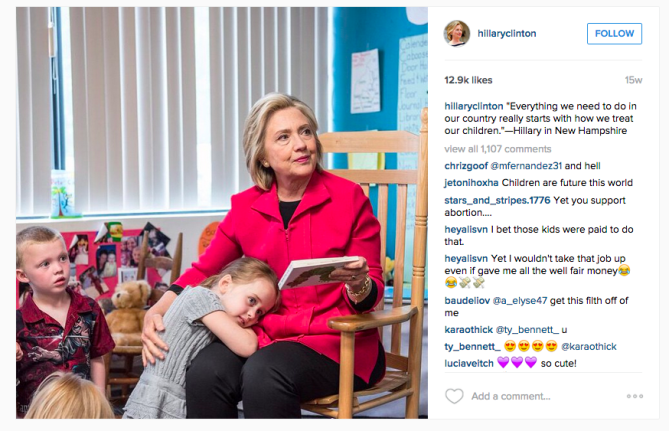a preemptive plea: please do not bombard me with hate because i am trying to find a way to write about someone whose politics you may not agree with and whose personality you may not like.
an anecdote: some months (ie. over one year) ago, i wrote a blog post on how i didn’t think i’d ever get around to writing about hillary clinton directly because writing about hillary clinton directly taps into too much of my own emotional baggage of growing up in the divisive media climate of the early 1990s. you can go read that at the link if you care to or take my word that it was a post about cultural analysis and FEELINGS and how it feels to be a woman and read how women are written about.
my cultural analysis of feelings garnered this comment:
which was hilarious, but also unnerving. because though this was a mild comment, i’d only written a blog post on my own feelings and could imagine the vitriol if i’d written something more substantial. the post receiving that comment was actually about the lingering effects of seeing the vitriol directed at HRC when i was growing up in the 90s. it is a vitriol i do not want to welcome in my daily life, and it is a vitriol that to this day surrounds HRC.
hillary clinton’s instagram is PAINFUL. i mean, i know many corners of the internet are painful, but i followed HRC’s instagram for literally less than one day before i realized that i could not let it into my life and unfollowed. i could not handle seeing the word “murder” so often in my instagram feed.
why this hate? i’ve wondered.
FOR YEARS. without diminishment.
it persists, in part, because she is still around and still in politics and still, as we all do, does stupid things. and it’s been 20 years of emotional buildup.
but it is beyond reason.
to the extent that though i said i’d never write a book about HRC, i’m simultaneously aware that my research methodology and biographical subjects are setting me up to do precisely that, should i ever want to.
but i do not know that i want to. i do not know that, emotionally, i could.
more and more i’m realizing that for me- and, i would hazard, for many of us- this comes back to a single word and, for my purposes in this post, i want to look at that word.
while we’re here, fyi:
i’ve mentioned HRC because, if we are to descend into the hell that is the feminazi phenomenon, HRC is our virgil.
come away with me…
way back in the early 1990s, there was beginning to be an internet to which like 10 people and all of the employees of the government had access. and there were beginning to be more cable channels. if i’m remembering correctly, in my early 90s girlhood, there were like 35 channels on our cable package. i honestly remember that going above 40 was a big, big deal and i think that was around 1998, and even then those were still the pay channels and there were maybe 1 or 2 we had of those, so it was a big deal of limited importance.
what i am saying is that there were fewer media outlets and the internet did not exist. what did that mean? we were, the whole lot of us over in america, exposed to a much more closely matched range of ideas and there was more of a congruity to our experience of the news.
reading the newspaper was an actual part of daily life for a giant number of americans, as opposed to the 23% today. somewhat inexplicably, reading the newspaper was actually a skill we were taught in my 10th grade geography class.
now, i can actually just only read publications that agree with me, or whose biases mirror mine. or my facebook feed- being full of my friends- can reflect back the views of people whose world views are also probably not far afield from me.
i don’t want to overemphasize how much of a development of the last 10-15 years that is, BUT. it IS hugely a development of the last 10-15 years.
and what it means is that i can curate my own experience of the news so that, if i want to, i have the option of reading reportage primarily written by people who agree with me and are like me.
that is not necessarily a critique, but it is essential background.
because in the early 90s you could not do that to the degree we can now. you had 30 channels, maybe. (if you had an antennae, you still only had about 5). and so the range of interpretations of the news was much smaller. cable news was pretty much just CNN.
i’ve a theory that WOLF BLIZTER’S THE SITUATION ROOM is a precipitating factor in the fragmentation and heightened emotion that characterizes the modern american media landscape. because when you had to have A SITUATION for four hours every afternoon,we were bound to wind up here.
that was a digression, but my point is that pre-THE SITUATION ROOM and the proliferation of cable news on MSN and FOX, a significantly higher percentage of the news coverage you watched would have contained news items you might not have liked and interpretations of those news items that you might not have agreed with.
hence my otherwise inexplicable girlhood encounters with mister rush limbaugh.
his influence on the america of the early 1990s was GINORMO and historical truthbomb: the republican revolution of the ’94 midterms was perceived, at the time, as a limbaugh victory.
more recently, limbaugh is famous for, in march 2012, calling sandra fluke a “slut” and “a prostitute” when she gave congressional testimony regarding her school’s contraception policy. the word feminazi was absent in his argument, but it has not wholly died out.
so, over here across the pond a few weeks ago, there was a feminazi resurgence, which quickly got lost in the allegations that, while at university, the prime minister did something naughty with a pig. but it was a pretty big deal while it was a pretty big deal.
and you can read about it here.
the daily mail, as you can imagine, was characteristically zen.
and the guardian did an article on how feminazi is the go-to internet troll term for anti-feminists. an article which included a shout-out to limbaugh:
but then distanced limbaugh’s use of the term from its current usage, which is something i find problematic.
a bit of etymology… limbaugh initially evoked the term feminazi in the context of abortion, saying:
I often use it to describe women who are obsessed with perpetuating a modern-day holocaust: abortion. There are 1.5 million abortions a year, and some feminists almost seem to celebrate that figure. There are not many of them, but they deserve to be called feminazis.
A feminazi is a woman to whom the most important thing in life is seeing to it that as many abortions as possible are performed.
limbaugh originally applied the word feminazi within the context of abortion, but the term quite quickly detached from that context, becoming a general catch-all for feminists. limbaugh himself used it as such.
not necessarily even the more extreme ideologies of the women’s movement- ie. feminists contending that women are superior to men- but also women fighting for equality.
significantly, though men can be feminists, only women are branded feminazis.
equally significant: this is a word that has, from the very beginning and with regularity ever since, been applied to HRC.
is it any wonder then that HRC arouses such strong emotions? in the american cultural imagination, she has been linguistically connected to the nazi party for over 20 years.
and is our contemporary shyness regarding the word “feminist” any wonder then as well? the word feminism has been associated with the nazis and murder, a gross distortion given its meaning of equality.
even meryl streep- who spent her birthday writing letters to congressmen begging them to support the ERA– is wary.
“I am writing to ask you to stand up for equality – for your mother, your daughter, your sister, your wife or yourself – by actively supporting the equal rights amendment,” streep wrote congress in july.
then, this week, when asked by time out london if she’s a feminist, streep says this:
as though feminism isn’t in favor of human beings.
you guys, if meryl streep is confused, heaven help us all.
for real though, this confusion makes historical sense. check it:
key passage #1: “i guess i am a feminist but i don’t see anything wrong with that unless one takes a violent approach.”
a bold statement from my 14-year-old self, and one which suggests how deeply connected feminism and violence were in american culture in the mid-90s.
key passage #2: “i hope my views weren’t out of line. i would never actually express them.”
i had enough problems.
i didn’t need to be accused of being a murderess.
we worry about the effects of literature so much that we ban books.
and we have enough of a national conversation around that that we also dedicate a week out of the year to the protest of the banning of those books.
but we are surprisingly, willfully ignorant to the effects of words and of stories from real life. the things our culture says about real people and the lasting impact those things have.
this is not a shout of CENSOR YOSELF!
it is an acknowledgement that there is an effect. an effect which it would behoove us to begin training our eyes to see.
i see culture as being like those terrible magic eye posters from the 90s, where if you looked at it long enough a picture of a dolphin or the face of marilyn monroe would emerge. i looked at so many of those posters and saw nothing.
culture is like that, except i seem to have some rare gift for seeing it- or at least i flatter myself i do- which means i all too often sound like a conspiracy theorist and have to interject the self-aware statement that i know i kind of sound like oliver stone.
but, YOU GUYS. it fits together. though we can’t always see it, though we are sometimes too close, still it fits together.
and when you do see it, it’s like ohmygod, guys, JUST LOOK. how can you not see that? it is RIGHT THERE. the dolphin is RIGHT THERE.
that is how i feel about so much of my work. it is RIGHT THERE. why are we not seeing this????
but then some days i think it’s easier, better not to see. to overlook the way all the pieces connect and how the story we tell today is part of a story we’ve been telling since the beginning of time and nothing is new and the world is really like this and people are rather more mean than you’d like to imagine and it all just goes on and on as- lost in the business of trying to get to tomorrow- we forget and so we live disconnected from our own pasts and all the cultural detritus that, over the course of our lives, informs our view of others and ourselves and our world. all that debris, scattered across all those years, it brings us to where we are now.
all that was once present and is now past is yet still visible in today.
so there you go.
i am tired. writing about HRC is depressing. i will leave you with a collage of cultural debris.

















































Amazing post – very well said!
Pingback: the daily mail, what women wear and the way we write about them (emotions via britney spears) | finding jackie
Pingback: why jackie?: an autoethnographic exploration | finding jackie
Pingback: we need to talk about hillary clinton too | finding jackie
Pingback: “Lothario DiCaprio will end up miserable and alone”: some thoughts on our current cultural moment and Leonardo DiCaprio’s toxic bacheloricity | finding jackie
Pingback: watching her | finding jackie
Pingback: “trump that bitch” redux | finding jackie